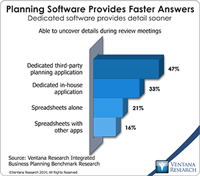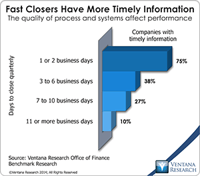Adaptive Insights held its annual user group meeting recently. A theme sounded in several keynote sessions was the importance of finance departments playing a more strategic role in their companies. Some participating customers described how they have evolved their planning process from being designed mainly to meet the needs of the finance department into a useful tool for managing the entire business. Their path took them from doing basic financial budgeting to planning focused on improving...
Read More
Topics:
Planning,
Operational Performance Management (OPM),
Reporting,
Budgeting,
Human Capital,
Analytics,
Business Analytics,
Business Collaboration,
Business Performance Management (BPM),
Business Planning,
Customer Performance Management (CPM),
Financial Performance Management (FPM),
Sales Performance Management (SPM),
Supply Chain,
Supply Chain Performance Management (SCPM),
Workforce Performance Management (WPM),
Demand Planning,
Integrated Business Planning,
Project Planning
Price and revenue optimization (PRO) software uses analytics to help companies maximize profitability for any targeted level of revenues. PRO utilizes data about buyer behavior to gauge individual customers’ price sensitivity and predict how they will react to prices. It enables users to charge buyers who appear to be less sensitive more than those who appear more price-sensitive. PRO is a significant departure from inward-focused, single-factor pricing strategies such as cost-plus pricing or,...
Read More
Topics:
Office of Finance,
Revenue Performance,
Nomis Solutions,
Business Performance Management (BPM),
Financial Performance Management (FPM),
Financial Services
There’s a long history of companies not paying close enough attention to the contractual elements of acquiring software. Today, this extends into the world of cloud computing. Many companies are choosing to acquire software services through cloud-based providers and increasingly rely on access to cloud-based data, as is shown by our forthcoming benchmark research, in which a large majority of participating companies said that having access to data in the cloud is important or very important. As...
Read More
Topics:
SaaS,
Operational Performance Management (OPM),
contract,
e-discovery,
Cloud Computing,
Governance, Risk & Compliance (GRC),
Business Performance Management (BPM),
Customer Performance Management (CPM),
Financial Performance Management (FPM),
Sales Performance Management (SPM),
Supply Chain Performance Management (SCPM),
Workforce Performance Management (WPM)
Because my research practice is centered on important business issues where technology is a key part of a solution, my written perspectives tend to focus on technology. However, it’s almost never the case that a company can just implement some application and fully resolve a business issue. Some progress may be achieved by using more effective tools, but in most cases results will fall short of what’s possible unless people, process and information issues are addressed as well. This is...
Read More
Topics:
Office of Finance,
Reconciliation,
Business Performance Management (BPM),
Financial Performance Management (FPM)














